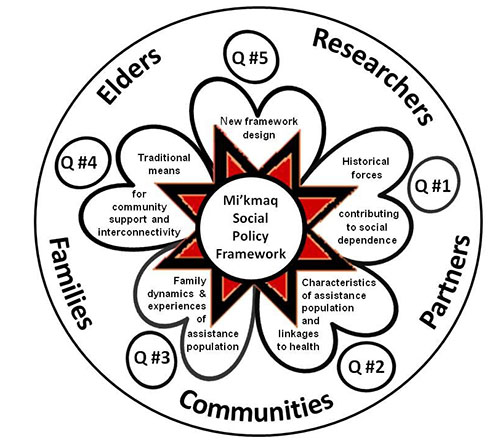News
» Go to news mainBuilding a Social Policy Framework for the Health and Well‑being of Mi'kmaq Communities in Nova Scotia

In the recent open operating grants competition from the Canadian Institutes of Health Research, "Building a Social Policy Framework for the Health and Well-being of Mi'kmaq Communities in Nova Scotia: A Two-Eyed Seeing Approach" led by Fred Wien (Professor Emeritus, Social Work) was successful in obtaining three-year funding in the amount of $446,000. Other Dalhousie participants involved in the project (pictured below with Fred Wien, L-R) include Carla Moore (Atlantic Aboriginal Health Research Program), Heather Castleden (Resource and Environmental Studies) and Debbie Martin (Health and Human Performance). Investigators from several other universities are involved as well.
Social policy is very important in Mi'kmaq and other First Nation communities because so many people - about half in the case of those who are Mi'kmaq living on reserve in Nova Scotia - depend on social assistance and related programs for all or some of their income. Leading edge research from the Canadian Institute for Advanced Research and other sources concludes that the environment provided to children, youth and adults by a life on social assistance - an environment characterized by poverty, stress, insecurity and challenges to parenting - has implications for health and well-being outcomes.
A two-eyed seeing approach
Mi'kmaq communities have been constrained in the development of social policy because of the federal requirement that programs need to be comparable to what is offered by the Province, despite the fact that the communities are quite distinctive both culturally and in other ways. However, the opportunity now exists for Mi'kmaq people to negotiate a sectoral self-government agreement that would allow them to develop and implement their own approach to social policy. This fits readily with a "two-eyed seeing" perspective, a concept that originated with Mi'kmaq elders working closely with one of the project team members. It is an approach that encourages drawing on the perspectives of both "Western" and Mi'kmaq traditions. The initiative to regain control in the social field is also in keeping with research that shows better health and other outcomes result when First Nation communities are able to control their own affairs and develop policies and programs that are culturally congruent. The project uses several methodologies, drawing from both Western and Indigenous traditions. It includes a historical component, quantitative research using available secondary data, interviews on the lived experience of persons living on social assistance, and extensive discussions with elders and others about the shape of Mi'kmaq-driven social policy framework.
This project represents a partnership between the Atlantic Aboriginal Health Research Program and the Mi'kmaq Rights Initiative of the Assembly of Nova Scotia Mi'kmaq Chiefs.
Recent News
- Applications open for Leon & Rose Zitner Prize
- Practicing what we preach: The importance of leisure and recreation for those who study, teach and work in health
- Dal Health announces new Associate Dean, Equity and Inclusion
- New Director announced for College of Pharmacy
- PhD in Health candidate recognized for her innovation in cancer research
- Dal Health’s School of Nursing to offer Atlantic Canada’s First Master of Nursing, mental health and addictions
- Dr. Catherine Mah is taking aim at social impacts on food purchasing and diet
- Faculty of Health research project finds creative culmination in Nocturne 2023 exhibit
